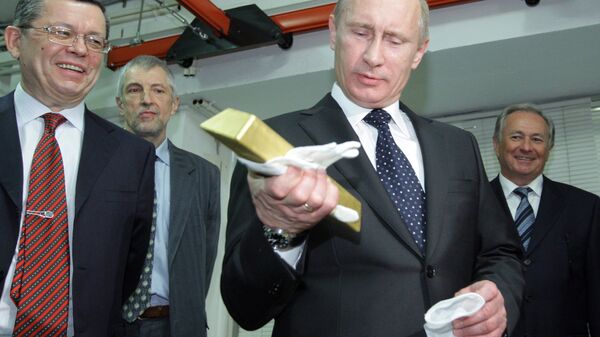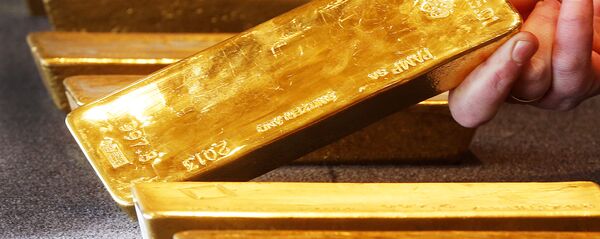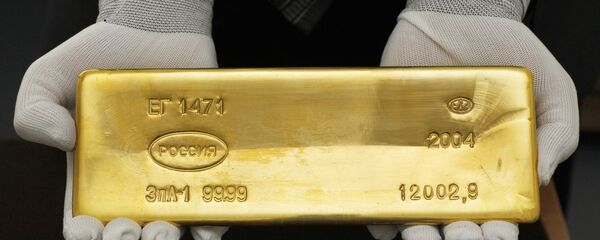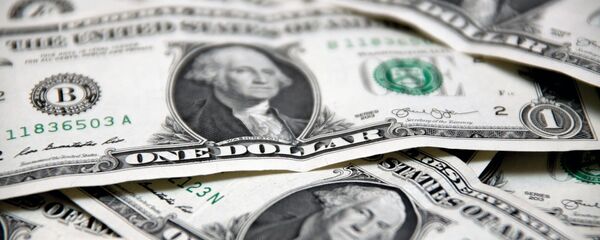Sputnik discussed the increase in gold purchases by Russia amid US sanctions with Dr Dan Steinbock, global economic and policy analyst.
Sputnik: How would you assess the increase in gold purchase by Russia? How could it help at a time of mounting US economic pressure?
Dr Dan Steinbock: Well first of all I think that it has been a very intriguing story; in the last four years, you know that Russia has been increasing its gold reserves. With another round of US sanctions, these gold purchases have accelerated. However, Russia has cut its US Treasury holdings even faster recently. In May 2017 the Treasury still peaked at $109 billion, by this summer there were barely a tenth of that — $50 billion, so Russia's shift from treasuries to gold will protect the Russian economy better against the new sanctions, that is a tactical shift.
There’s something else going on with the dollar, I believe that's strategic, the concern that Russia has steadily increased holdings since the global financial crisis in 2008, the US debt limit crisis of 2011 and several subsequent rounds of US sanction against Russia. Following his inauguration, President Putin warned about what he called the dangerous dollar monopoly, and I think that there are legitimate reasons for concern.
Dr Dan Steinbock: I think that there is an inherent contradiction in US policy right now. Historically, at least, there was until the end of the Cold War an effort to create international alliances.
What we see now is the 'America First' approach, which is something very, very different. It’s very hard to have those two approaches because if you want to cooperate with other countries but only in terms of America First, you’re bound to be in a situation where you will reject all the existing alliances, the existing trade agreements. You want to renegotiate new ones in terms of national interests, and yet you proclaim your support for the international community.
That simply doesn’t work, and I think we’re now getting to a potentially conflicting situation at that. For instance, in the Obama era, the sanctions were launched against Russia, now the Trump administration is reversing the US entirely, the US post-war stance on globalization, and waging a somewhat self-detrimental tariff war against China, at the same time this war has already been expanded or extended to US NAFTA partners — Canada and Mexico.
Turkey is suffering from the currency crisis, so many of these countries that used to cooperate willingly and very closely with the United States find themselves in a very difficult position, not just with President Trump, but already with the developments that started with President Obama.
Sputnik: Can you comment also on the Swift system, which is something that the German minister said that they were going to try to find a way to go around? Because there is a risk that Iran, for instance, will be cut off from the Swift system and that would, of course, make it very difficult for the Europeans who are signatories of the JCPOA to continue dealing with Iran.
Dr Dan Steinbock: The JCPOA I think was a very important agreement and there are actually many people that feel that Iran gave in quite a lot in achieving that agreement, so we’re now in, a very strange situation where one country has made a deal with half a dozen other countries, including the United States, and then suddenly it finds this legitimate agreement being undermined.
The leverage that the United States is using in this particular case, I believe, is mostly with the European and Japanese companies operating with Iran or in Iran. As they do so they’re bound to end up with these currency issues, but one way of avoiding this is simply to use national currencies rather than international currencies.
I have been impressed by the fact that the Europeans in this particular case actually have tried to keep their word and have taken a tougher stance willing to confront the United States, and I think that they understand that if they don’t do it now then ultimately those pressures will be targeting first Germany and then the other European trading nations: it’s not good for anybody.
Views and opinions expressed in this article are those of Dr Dan Steinbock and do not necessarily reflect those of Sputnik.







